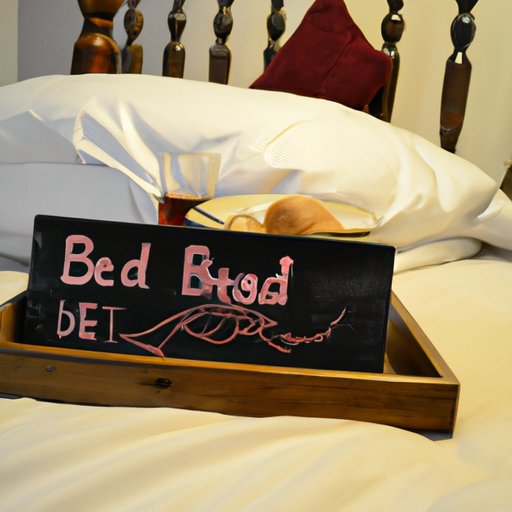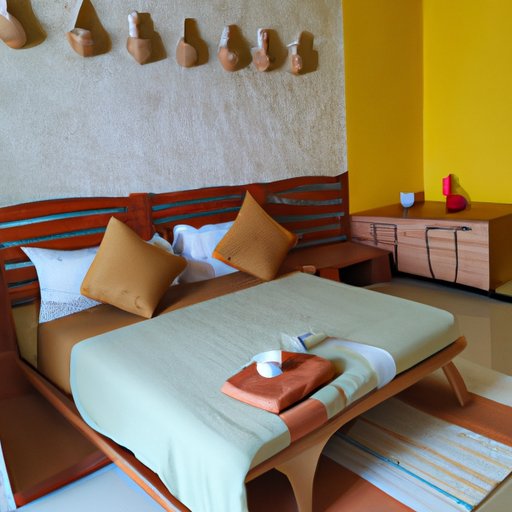Introduction
Bed and breakfasts (B&Bs) provide travelers with an intimate and cozy home-like atmosphere. They create a unique experience for guests, offering them an opportunity to explore a new place without having to sacrifice the comforts of home. Owning a B&B is a great way to make extra income, as well as meet people from all over the world. However, starting a B&B requires careful planning and research, as there are many steps involved in the process.

Definition of Bed and Breakfast
A bed and breakfast is a type of accommodation that offers overnight lodging and a small meal in the morning. Typically, B&Bs are located in family homes or businesses and provide guests with a more personal and home-like experience than other types of accommodations such as hotels or motels. B&Bs may also offer additional services such as transportation, spa treatments, and cooking classes.
Benefits of Owning a Bed and Breakfast
Owning a B&B is a great way to make money while doing something you love. According to a study by Hospitality Net, the global B&B market is growing at a rate of 4.7 percent annually, and it is expected to reach $14.9 billion by 2024. Additionally, owning a B&B can give you the opportunity to meet people from all over the world and make connections that can help you in the future. It can also provide you with the freedom to set your own hours and decide which services to offer.

Outline the Steps of Starting a Bed and Breakfast Business
Starting a B&B can seem like a daunting task, but it doesn’t have to be. By following these steps, you can get your business up and running in no time.
Research Local Regulations and Licensing Requirements
The first step in starting a B&B is to research local regulations and licensing requirements. Every state has different laws and regulations regarding B&Bs, so it’s important to familiarize yourself with your local laws before starting your business. Additionally, you may need to obtain certain licenses or permits in order to operate legally.
Identify Potential Locations
Once you’ve done your research on local regulations and licensing requirements, you’ll need to identify potential locations for your B&B. Consider factors such as proximity to attractions, access to transportation, and local competition when selecting a location. You should also take into account any zoning laws that may affect your business.
Calculate Start-Up Costs
When starting a B&B, you will need to calculate the costs associated with buying or renting property, renovating the space, and purchasing furnishings and supplies. Make sure to factor in any additional costs such as insurance, taxes, and advertising fees. Having a clear understanding of your start-up costs will help you determine how much financing you need.
Obtain Financing
Once you know how much money you need to start your B&B, you’ll need to find a way to finance it. Traditional bank loans are one option, but you may also want to explore government grants, private investors, and crowdfunding platforms. Be sure to do your research and compare different financing options to see which one best suits your needs.
Design Your Space
Now that you have the finances in place, it’s time to start designing your space. Decide on the number of rooms you want to offer and choose the right amenities. Select furniture and décor that will appeal to your target audience and create a welcoming atmosphere. Don’t forget to include storage space for linens, supplies, and other items.
Create a Marketing Plan
Creating an effective marketing plan is essential for the success of your B&B. Utilize social media platforms, create an engaging website, join online travel communities, and develop a network of referrals. You may also want to consider traditional forms of advertising such as print and radio.
Identify the Legal Requirements for Opening a Bed and Breakfast
In addition to local regulations and licensing requirements, there are certain legal requirements you must comply with in order to open a B&B. These include health and safety standards, fire codes, and tax laws. Make sure to consult with a lawyer to ensure that you are in compliance with all applicable laws.

Establish a Budget for Starting a Bed and Breakfast
Developing a budget is an important step in starting a B&B. Consider the cost of buying or renting property, renovation costs, furniture and supplies, and potential revenue sources. Having a clear budget will help you stay organized and keep track of expenses.
Gather Financing for Your Bed and Breakfast
Once you’ve established a budget, you’ll need to find a way to finance your B&B. Traditional bank loans, government grants, private investors, and crowdfunding platforms are all viable options. Compare different financing options to find the one that best meets your needs.
Determine the Location of Your Bed and Breakfast
Choosing the right location for your B&B is crucial. Research local tourism trends, analyze local competition, and evaluate accessibility to transportation. Keep in mind that the location of your B&B can have a major impact on its success.

Design Your Bed and Breakfast to Appeal to Guests
Designing your B&B to appeal to guests is essential for attracting customers. Consider the number of rooms you want to offer and choose the right amenities. Select furniture and décor that will create a welcoming atmosphere and make your guests feel at home.
Develop an Effective Marketing Plan for Your Bed and Breakfast
Having an effective marketing plan is key to the success of your B&B. Utilize social media platforms, create an engaging website, join online travel communities, and develop a network of referrals. Traditional forms of advertising such as print and radio can also be beneficial.
Conclusion
Starting a bed and breakfast business can be a rewarding experience. To get started, you must research local regulations and licensing requirements, calculate start-up costs, obtain financing, determine the location, design the space, and develop an effective marketing plan. With careful planning and research, you can successfully launch your B&B and start making money.
(Note: Is this article not meeting your expectations? Do you have knowledge or insights to share? Unlock new opportunities and expand your reach by joining our authors team. Click Registration to join us and share your expertise with our readers.)
